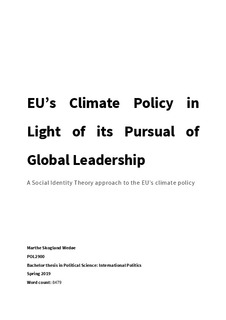| dc.description.abstract | As it is established that the EU is regarded as a leader within climate policy and that it has a desire to attain a higher status globally, it is interesting to explore to what extent these two features are related. The Social Identity Theory (SIT) will here be used as a theoretical framework as it shows how a group who performs well within one area can seek to generalize this position. For the EU, the US plays a significant role in deciding if it is allowed leadership, both within climate policy and in general. The US’s notable position is mostly due to it being of slightly higher status than the EU. Global leadership is one of the multiple motivations behind the EU’s active climate policy, but it seems that leadership just within climate policy plays a more prominent role as a motivation for the EU | |
